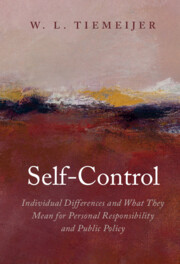 Self-Control
Self-Control Book contents
- Self-Control
- Self-Control
- Copyright page
- Dedication
- Epigraph
- Contents
- Figures
- Tables
- Acknowledgments
- 1 Introduction
- Part I Self-Control
- 2 A Gift for Life
- 3 How Situation Undermines Self-Control
- 4 Building Self-Control?
- 5 The Value of the Future
- 6 The Self-Control Effects of Poverty
- Part II Implications for Society and Politics
- Notes
- Bibliography
- Index
6 - The Self-Control Effects of Poverty
from Part I - Self-Control
Published online by Cambridge University Press: 20 August 2022
- Self-Control
- Self-Control
- Copyright page
- Dedication
- Epigraph
- Contents
- Figures
- Tables
- Acknowledgments
- 1 Introduction
- Part I Self-Control
- 2 A Gift for Life
- 3 How Situation Undermines Self-Control
- 4 Building Self-Control?
- 5 The Value of the Future
- 6 The Self-Control Effects of Poverty
- Part II Implications for Society and Politics
- Notes
- Bibliography
- Index
Summary
This is the last chapter of Part I. It illustrates the explanatory power of the findings thus far by applying them to a well-known puzzle: Why is it that poor people so often seem to lack the willpower and discipline to improve their life circumstances? Sometimes this is explained by reference to a “culture of poverty,” but this explanation is highly controversial. This chapter provides a fresh take on this contentious issue by showing that, irrespective of the sociology, there certainly exists a psychology of poverty. Based on a wide range of data, I show that poverty is correlated with a higher incidence of all the factors undermining self-control discussed in the preceding chapters. I also show that children who grow up in poverty more often experience the circumstances that hamper the development of self-control, while adults who live in poverty more often experience the situational conditions that hinder the successful exercise of self-control. The upshot is that punishing the poor for undisciplined behavior – say by cutting their welfare – may well be counterproductive.
Keywords
- Type
- Chapter
- Information
- Self-ControlIndividual Differences and What They Mean for Personal Responsibility and Public Policy, pp. 117 - 134Publisher: Cambridge University PressPrint publication year: 2022
- 1
- Cited by
